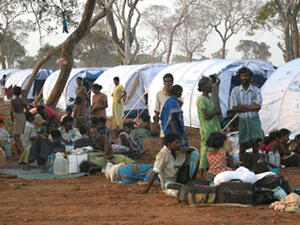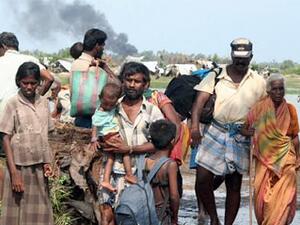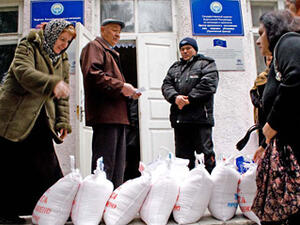Long desert drive brings Libyan aid to refugees in Chad
Long desert drive brings Libyan aid to refugees in Chad
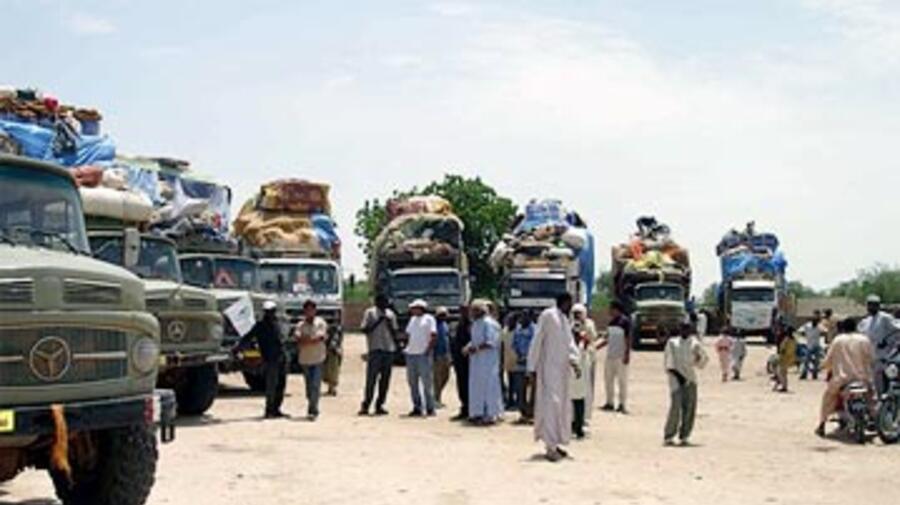
GIFCA's convoy brought tents, blankets, sleeping mats, oil, sugar and clothing from Tripoli to Abeche in eastern Chad.
ABECHE, Chad, Oct 14 (UNHCR) - Piles of mattresses tower precariously atop eight heavily-laden trucks still covered with a fine layer of sand from their two-week journey through the desert to reach the refugee camps in eastern Chad. From its starting point in Tripoli, the convoy arrived in Abéché, Chad, bringing the second donation by Libyan foundation GIFCA (Gaddafi International Foundation for Charity Association) to the relief effort for nearly 200,000 refugees from the Darfur region of Sudan.
The aid supplies, including 290 tents, 3,000 blankets, 1,200 sleeping mats, 200 cases of oil, 300 sacks of sugar, and numerous bundles of clothing, seem to reach to the sky. Jerry cans strung together hang from the sides of the enormous loads.
From two of the trucks, the sound of bleating floats down from on high. Perched atop the mounds of relief items stand two goats, looking down at the crowd that has gathered around the convoy. The goats, however, are the only part of the load not destined for the refugees - the convoy personnel had to bring with them everything needed during the journey, including food, and goats are a common source of meat in this region.
The convoy drivers joke around and laugh, obviously happy to have arrived after two weeks on the road, winding their way across the sand dunes and sleeping at night under the stars in the desert.
"When you are working in the humanitarian sphere, you don't think about the discomfort, because it is for a humanitarian goal," said convoy leader Mashala Hamid.
The overland route from Libya is one of the ways humanitarian agencies are trying to bring aid supplies to this remote region, which has become even more inaccessible since the onset of the rainy season. GIFCA already tried out the desert route from Libya for its first overland shipment in June. That shipment brought in two truckloads of relief items, including 500 mattresses, 500 sleeping mats, 500 blankets, 500 mosquito nets, 39 plastic sheets, 1,000 kettles, 1,000 pots, 500 cartons of soap, and 1,000 flashlights.
The World Food Programme is also testing the overland desert route as a way to bring in food supplies. The first truckloads of WFP food brought in via Libya were distributed in September in the refugee camps.
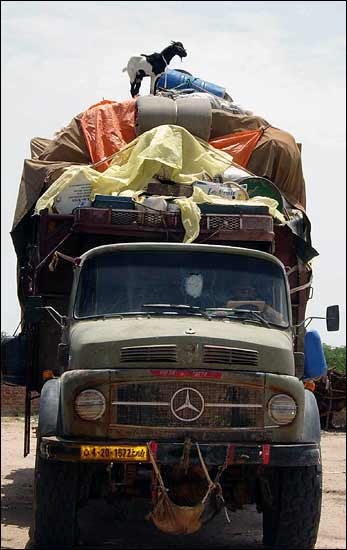
Haute cuisine - the Libyan truck drivers also brought goats for food.
UNHCR has also been airlifting relief supplies like tents, blankets, soap and jerry cans. So far this year, more than 2,800 metric tons of aid have been flown in on UNHCR's emergency airlift from countries as far away as Pakistan, Denmark, Germany and Tanzania. Airstrips in the east of Chad near the refugee camps, however, are too small to handle large cargo flights, so airlifted supplies have to be flown to N'Djamena and then trucked to Abéché. The 891-km journey by truck in the dry season takes three-and-a-half days. At the height of the rains, it takes more than two weeks, and has even required UNHCR to take convoys north and hire a guide to cross the Sahara desert. During the rainy season, the French military helped cut down on transport time, flying in some of the supplies from N'Djamena to Abéché on Hercules C-130 aircraft and then onward to the camps on Puma helicopters.
The eight truckloads of aid from Libya are the latest additions to the tons of supplies ferried one way or another to this isolated region.
"We know that the goods are much appreciated by the refugees," noted Craig Sanders, UNHCR's Senior Emergency Coordinator for eastern Chad. He pointed particularly to the donation of tea kettles and sugar included in the first shipment in June which, as an important part of the refugees' culture, was especially welcome.
Meanwhile, the latest contributions from GIFCA have been offloaded into UNHCR's warehouses, where the relief items will be stored temporarily until they can be incorporated into regular distributions to the refugees. Once emptied of their loads, the trucks head out again into the desert for the long trek back home to Libya.





